Science Talk: TSRI and the 2001 Nobel Prize in Chemistry
News&Views asked individuals at The Scripps Research Institute (TSRI):
What was your first reaction when you heard that W.M. Keck Professor K.
Barry Sharpless had won the Nobel Prize in Chemistry? What are your other
thoughts on the award?
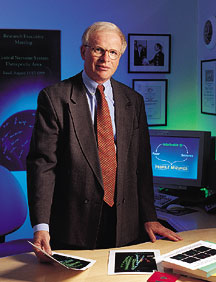 Tamas
Bartfai, professor of neuropharmacology Tamas
Bartfai, professor of neuropharmacology
I was at home. In the morning I knew that it would be announced
in Stockholm (it's always the same time) I looked [online]. I didn't
see the final text, but I checked the wording. The wording is very
important—it says "the prize is given for this" and only that.
And it's also important because it means that nobody else can get
the prize for this later.
This prize has been in the works for a long time. Asymmetric synthesis,
to which all three of them have contributed. My initial reaction
was that it was nice that this was done—that it's out of the
way. There are prizes that are expected by many, but there is only
one prize per year—no more, no less.
I was relieved and I was glad. Each year, you think, "Is this
a good prize?" One should think that all of the prizes are given
for outstanding achievement. And this is true. And I don't want
to belittle others, but this is a very good prize. Nobel was very
interested in practical applications and the fact that [Sharpless's
work] is used now in the manufacture of several marketed, clinically
useful drugs is a strong argument.
A friend, a colleague [from another university] said to me, "Do
you see him often?" and I said, "Not often enough."
|
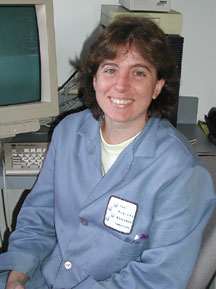 Antonella Converso, fourth-year graduate student in the Sharpless
lab
Antonella Converso, fourth-year graduate student in the Sharpless
lab
We were very pleased and excited. We all thought it would happen,
we just didn't know when. It is an incredible feeling to work in
a Nobel Prize-winning lab, to share the moment.
The award is great publicity for TSRI: now everybody who watches
the news will know it's a great place for science. For sure it will
help attract new high caliber graduate students. Barry is a captivating
figure; his enthusiasm is amazing.
The lab has been inundated with phone calls, faxes and letters—from
past group members, colleagues and people he has never heard from
before. The lab received more than 100 envelopes just yesterday
afternoon, not to mention the hundreds of emails that flooded Barry's
in box.
|
 Albert
Eschenmoser, professor of chemistry Albert
Eschenmoser, professor of chemistry
I was at home. My wife told me. She had a phone call from one
of her friends, who knew. This was no surprise to me that it was
Barry who got the prize.
As a matter of fact, a few days before my colleague and I had
lunch together, and he asked me who is going to get the Nobel prize
in chemistry. I said, "No problem we have him in our house [TSRI]."
And on the day it became known, my colleague came again and said,
"How did you know?" He suspected that I had secondary channels,
and I had to convince him otherwise-it was pure insight into the
scientific merits nothing else.
There is no doubt that Sharpless's contributions to organic chemistry
are indisputable as Nobel-worthy works. [I say this] for two reasons:
first, it's a well defined contribution, and second, its impact
is enormous. It influences the everyday work of a large number of
organic chemists. And scientifically, it is absolutely original.
It is a chapter in the struggle of organic chemists to acquire the
capability of doing synthesis via enantioselective catalysis.
Sometimes people stumble upon something important, but I happen
to know that Sharpless is not a stumbler. He systematically planned
his research over years, following the dream of being able to do
such a thing. Actually, every chemical invention is, at the same
time, also a discovery. Sharpless's inventions are induced discoveries,
not stumbled upon, discoveries.
[Barry] could be called the most chemical chemist, because intuition
is such an important part of what he does. One way of [describing]
his intrinsic originality is to note that he is one of those people
who is absolutely unpredictable in what he is going to say. With
many normal people you can predict what a discussion is going
to be. Not with Barry.
|
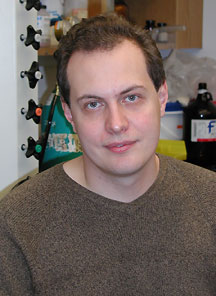 Valery
Fokin, assistant professor in the Sharpless lab Valery
Fokin, assistant professor in the Sharpless lab
We knew it was going to happen one day, but the news was still
a tremendous surprise. It is definitely well-deserved. Excitement
was my initial reaction—and it still continues. On a bigger
scale, [the Nobel Prize] is a recognition not only of Barry's achievements
but also of the significance of the area of chemistry which he pioneered.
It's exciting to be a part of it and to work with Barry—he
is infinitely enthusiastic about chemistry.
The lab is currently working on projects related to catalytic
oxidation of olefins as well as applications of the products afforded
by these oxidations. The latter is a logical continuation of what
was developed before. We now have excellent methods to selectively
convert olefins to new, more reactive intermediates. It is time
to learn how to use them—be it searching for biological activity
or new materials. We've prepared libraries of diverse compounds
and, in collaboration with colleagues from the institute, screened
them against various biological targets, uncovering very interesting
leads. But all projects in our lab have a common goal: discovering
new, efficient ways to make functional molecules.
|
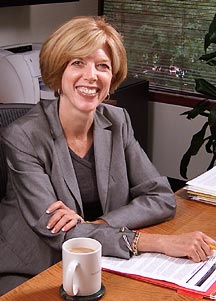 Robin
Goldsmith, vice president of communications Robin
Goldsmith, vice president of communications
Fortunately, someone from TSRI's security department woke me before
6 AM. After the initial sense of excitement and delight, I rushed
into the office, knowing that there would be a great deal of work
to do, materials to prepare, media inquiries to respond to, etc.
When I arrived, there were some 15 voice mail messages from reporters—mainly
from the East Coast, but also from all over the world. We coordinated
our efforts with Dr. Sharpless's office and sent a media advisory
to the local press, announcing a news conference for 11 AM. I must
give enormous credit to my staff as well as to Dr. Sharpless's,
especially Laureen Stav. Within a few short hours, news releases
were written, press kits were assembled, inquiries were responded
to, information was posted on TSRI's web site, efforts were coordinated
and organized. At 11 AM, Dr. Sharpless stepped into the media glare,
and did an absolutely wonderful job of explaining his work and its
significance, as well as [sharing] his generosity of spirit and
excitement about the discovery process with all those in attendance.
He continued to be exceedingly patient and available to members
of the media and well-wishers throughout the day.
This was such a wonderful event in the life of the institute,
for which we all owe Dr. Sharpless a huge debt of gratitude. I think
that TSRI staff and employees took great pride in participating
in such a celebratory and exciting occasion.
|
 Jeffery Kelly, vice president for academic affairs and dean of graduate
studies
Jeffery Kelly, vice president for academic affairs and dean of graduate
studies
[That Barry Sharpless won the Nobel Prize was] wonderful and fitting
news given the tremendous impact that Barry's reactions continue
to have on academic and industrial research. [It was] also a great
day for the Scripps community, [TSRI President] Richard Lerner,
and our donors, in that it shows what can be done with creative
leadership coupled with philanthropy and the hard work of imaginative
scientists.
|
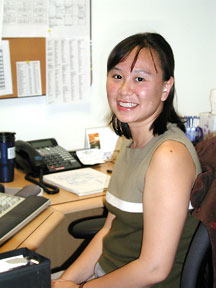 Khanh
Nguyen, Human Resources employee representative in charge of recruiting
support services personnel Khanh
Nguyen, Human Resources employee representative in charge of recruiting
support services personnel
[Human Resources Manager] Ellen [Anderson] came in and told us.
That day, [Employment Representative] Kelly Kehoe, [Senior Employment
Representative] Linda Kauffmann, [Employment Assistant] Melanie
Brittle, and I were at a job fair at UCSD [the University of California,
San Diego]. There was a big crowd around us all day. We had brought
three bins of material about TSRI and we ran out of everything in
an hour. We were swamped.
We've been seeing more resumes submitted to us from people around
the world. It's awesome. In fact, I just received a resume from
a former employee here who wrote in her cover letter that she was
reminded of TSRI by the Nobel Prize. She remembered it was a good
place to work, filled with people of the highest caliber, and now
she's submitting her resume. That is great for TSRI.
|
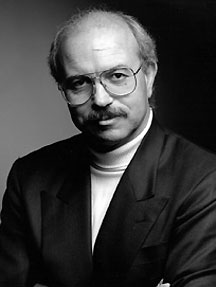 K.C.
Nicolaou, chair of the Department of Chemistry K.C.
Nicolaou, chair of the Department of Chemistry
I think I learned of the Nobel Prize announcement before almost
anyone else at Scripps. I was in London and it was morning there.
On Tuesday, the day before the announcement, I was having dinner
with some colleagues, and they asked me who I thought might be this
year's winner. And I mentioned Sharpless, Noyori, and Knowles. Sure
enough, the next day I called up my sister, who is a manager in
a bank in London, and asked her to look at the web and call me back.
Five minutes later the phone rang and she started reading to me,
"William Knowles, Ryoji Noyori..." And I said, "Barry Sharpless."
And she said "yes." That was the first time I heard about it. It
was maybe 4 AM Pacific Time. I was ecstatic.
On Tuesday, the day before, I also called up [Administrative Manager]
Vicky [Nielsen] and told her, "In case Barry wins tomorrow throw
a big party." It was so clear in my mind that he is extremely deserving
of the Prize and it was just a matter of time. The whole department
is very happy for him. This department is only 12 years old and
we have our first Nobel laureate. Who knows, there may be more...
The revolution of asymmetric synthesis, as we know it today, owes
a lot to Sharpless and the others who share the Nobel Prize this
year. Because of these developments in asymmetric synthesis, we
have chemical processes by which we can produce compounds in their
correct absolute stereochemistry. This is extremely important for
the drug discovery process and the manufacturing of drugs, because,
often, it is necessary to have only one of the two enantiomers of
the drug since the other may have either diminished or no activity
or may even have a deleterious effect. The discovery of asymmetric
epoxidation made by Barry Sharpless has truly revolutionized chemical
synthesis as we practice it today.
The Nobel Prize is the ultimate recognition that the scientific
community can bestow on one of its members. Barry was clearly headed
this way and we're delighted that he was finally honored in this
way. We now have a better place to work and be inspired. I think
Scripps is now recognized, beyond any doubt, as a top research institution
in the world, especially in chemistry. We are absolutely delighted
to share in Barry's joy that this prize must bring to him and to
his family. We are all proud of him and feel fortunate to be associated
with him as colleagues in the same department.
|
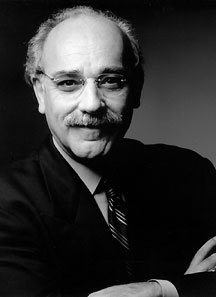 Julius
Rebek, director of The Skaggs Institute for Chemical Biology Julius
Rebek, director of The Skaggs Institute for Chemical Biology
I was in the shower. When I got out of the shower, I heard the
voice mail being left on our recorder from a common acquaintance,
a Professor Pinot Pilotti of Stockholm University.
So I called Barry right away, and miraculously I got through.
I thought "there is no way"—I thought I would have to walk
over there to see him because I live very close. I got through,
I talked to him, and I called my parents, since my mother had met
Barry on a couple of occasions and was charmed by him, as you could
imagine. So my mother called him and got right through.
It has finally happened. We've been hoping for this for quite
awhile; it could have happened any time in the last ten years. If
you read up on the technical aspects of it, the key Sharpless discovery
was made around 1980, and it influenced research tremendously in
the 1980s and 1990s.
I've had acquaintances—Donald J. Cram, Jean-Marie Lehn, George
A. Olah, Roald Hoffmann—who have won the Nobel Prize. But to
have one of your close friends win... it makes for a great week.
Especially if he is your colleague. And I don't want to speculate,
but I think this won't be the last time somebody in The Skaggs Institute
wins one.
|
Go back to News & Views Index
|
|



